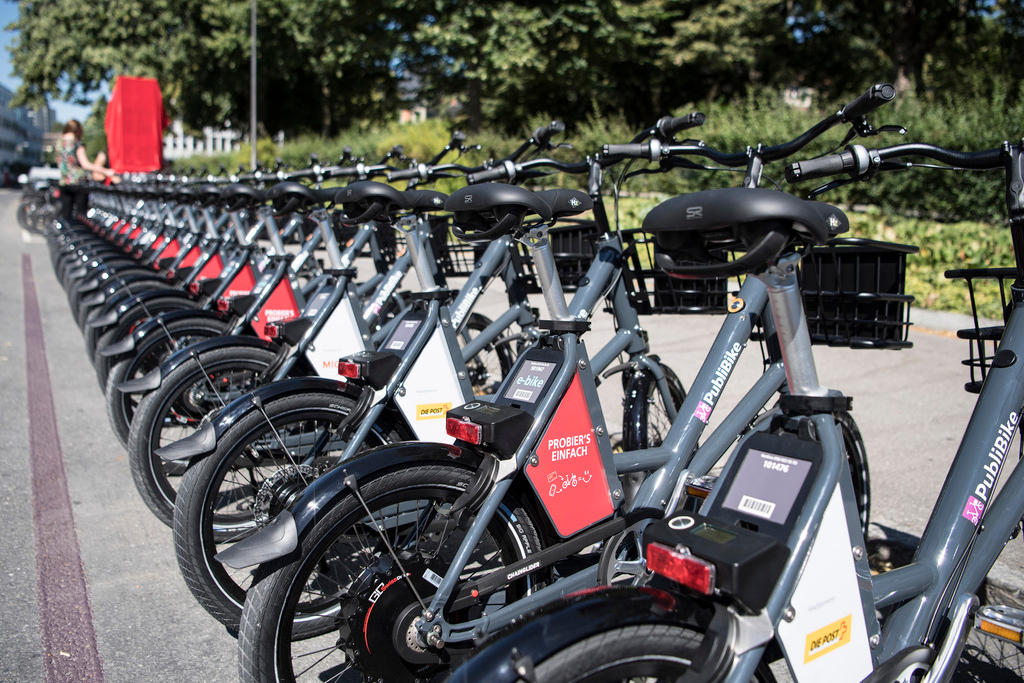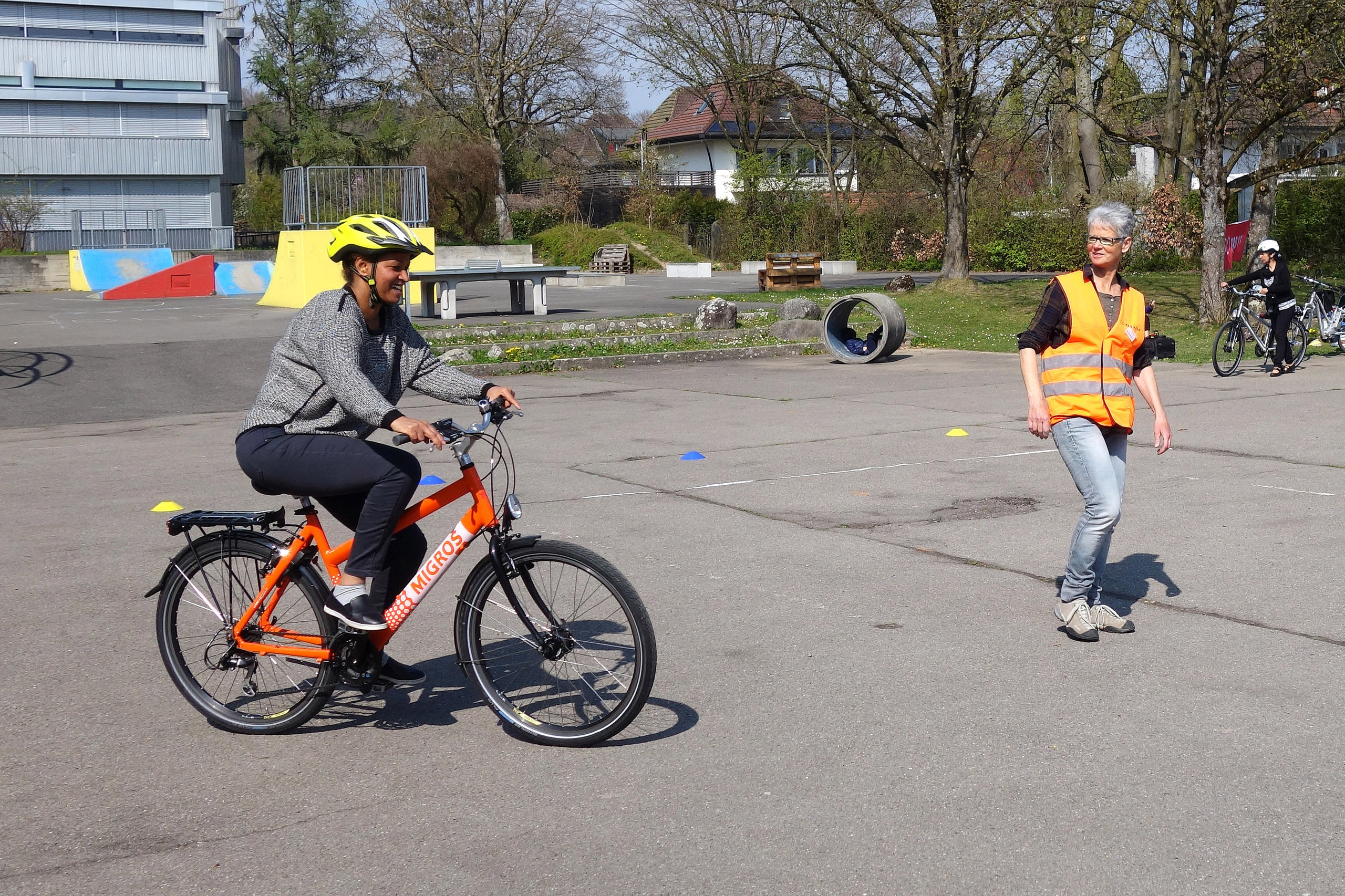Shared bikes, vandalism, and public space in Bern

Bern has seen an explosion in the number of cyclists on its streets in recent years – an increase actively encouraged by city authorities, but not by everyone.
Bernese commuters, who according to one recent estimateExternal link are forced to endure the world’s lowest average daily travel time (21 minutes), woke this June to find another form of transport conjured for their disposal.
Almost overnight, 70 PubliBikeExternal link stations had sprung up like metal bushes throughout the city’s neighbourhoods; at each one, a dozen or so chic-looking, matte-black, compact-framed bikes – about half of them electric, the other half normal, i.e. human-powered.
And this is only the beginning. The plan, says Michael Liebi of the city’s transport department, is to expand the network towards a peak of 2,400 bikes in 2020, at which point Switzerland’s fifth-largest city – where public transport on average never leaves you more than 300 metres from the next stop – will boast the country’s biggest bike-sharing system.
Does it need it? Yes, says Liebi’s boss Ursula Wyss, a Social Democrat politician who took over the city’s transport dossier in 2012. For her, it’s all part of a grander scheme to improve quality of life in public spaces, a goal she outlined in a manifesto painting her vision of the Bern of the future.
“Public space is today – more than a few decades ago – an integral part of a vibrant, social and ecological city,” she writes. “In a democratic society, we all have a right to public space […] And the more people that live in dense urban areas, the more important the quality of this public space becomes.”
Bern dwellers may also have noticed this summer a selection of rehabilitated zones scattered across the city: previously empty areas now decorated with elderly-friendly seating and football tables – efforts to create spaces where it’s more “pleasant to linger”, as the manifesto put it. Some streets are closed completely to traffic several times weekly.
Bikes are a key component of this. As part of a three-pronged “multi-modal” transport theory (walk short distances, bike medium ones, take public transport for the rest), Wyss wants to increase bike trips as a proportion of overall traffic from 15% to 20% by 2030. And growth in recent years – cycling in Bern rose by 35% between 2014 and 2017, while areas around the train station are clogged with parked bikes – shows that the push is working.

More
Biking still faces uphill battle in Switzerland
Constitutional change
Liebi says that northern European cities – especially those in Germany and the Netherlands, and of course the global cycling mecca of Copenhagen, where over 40% of commutes are done by bike – serve as inspiration for best practice in Bern.
But it’s not simply about ‘build the infrastructure and they will come’, he says. On one hand, you have to make cyclists, especially débutants, feel safe; for example, by clearly separating bike and car lanes. On the other hand, you have to nurture a cycling culture over time, especially by getting people into the saddle at an early age.
Both these objectives are also high on the agenda of Pro Velo Bern, an advocacy group with sister offices in most other Swiss cities. The group offers introductory cycling courses for all ages and social backgrounds, as well as organising bike sale events and lobbying authorities to improve conditions for cyclists.
Rebecca Müller, manager of the Bern office, is happy with progress. She explains the current renaissance of cycling as being the result of several overlapping trends: health, of which both citizens and policymakers are increasingly aware; ecological concerns about pollution and sustainability; and social practices – bikes are trendy again.
Yet, naturally given her job, she would like to see more done. The immediate priority is to push for a yes outcome in an upcoming vote on September 23, when citizens will decide on a modified version of the Pro Velo-sponsored initiative to enshrine cycling alongside walking in the Swiss constitution (see infobox below).
As for Publibike, and the various other bike-sharing schemes in cities such as Basel, Zurich, and Lausanne, Müller and her colleagues are cautiously optimistic. If such initiatives help to shift some of the 50% of Swiss car journeys under five kilometres to bikes, then this is progress.
Putting the brakes on
But not everybody is happy. Though four-fifths of voters in a recent swissinfo.ch poll said that such bike-sharing schemes were a “positive innovation” rather than a “waste of space and money”, concerns have been voiced.
Some of the worries have been about the commercial appropriation and “blighting” of scarce public space (as the NZZ newspaper put it) by private companies. Others have flagged further dangers: in Zurich, for example, the Singaporean O-Bike initiative was not only roundly criticised for the poor-quality bikes, but some also suspected the scheme of being a front for a wider collection of user data.
Even more tellingly, in Bern, just a few weeks after PubliBike was rolled out, the app-based electronic locking and tracking system was hacked (quite easily), and half the fleet went ‘missing’ for a weekend. Some days of haphazard searching later, the bikes were all taken in to be fitted with an improved security system. At the time of writing, the various docking stations around the city remain empty.

More
Swiss to vote on enshrining cycling in the constitution
For their part, PubliBike and Wyss have made noises about vandalism and a lack of respect in the wake of the Bern hacking. But was this just run-of-the-mill vandalism or do such actions signal opposition to shared bikes and a larger antipathy to paternalistic politics of public space? (Swiss cities are often left-leaning islands in a sea of rural conservatism.)
“The phenomenon can be used to think about what public goods and spaces are and how we treat them,” said urban sociologist Barbara Emmenger in the Bund newspaperExternal link recently. It’s not enough to point a moralising finger at such wanton vandalism, she said. The point is to ensure that citizens – from all social classes – are involved in how their spaces take shape.
Indeed, the politics of public space and bicycles remains, after all, politics – something the local Berner Zeitung newspaper also didn’t shy away from when it wrote a profile of the left-wing transport chief in June this year with the not-so-subtle title of “The Powerplay of Ursula Wyss”.
“Naturally,” it wrote, “the use of public spaces also involves power-psychological dimensions. When people occupy and shape spaces, they identify with them, as well as with the government and administration that has made it possible”.
Tellingly, the only party that is opposing the September constitutional vote is conservative-right People’s Party (somewhat marginalised in the local Bernese landscape), mainly on the grounds that it is irrelevant, that enough people use bikes in Switzerland already, and that the national government is stepping beyond its remit.
Again, whether or not this is true is matter of degree, and one which will probably be decided by your political instinct rather than purely your head. And though the People’s Party will be hard-pushed to convince the electorate to reject an initiative backed by the government and all other parties, it nevertheless reveals an obvious truth: though cycling will continue to grow, some don’t want to be told to get on their bike.
On September 23, 2018, Swiss voters will vote on whether or not to enshrine cycling paths in the constitution, 40 years after walking and hiking trails were accorded the same status.
The wording up for vote is a counter-proposal offered by the government in response to an initial initiative suggested by Pro Velo Switzerland, who wanted to oblige the federal government to take control of coordinating the development of cycling infrastructure in the country.
The counter-proposal relaxes the wording slightly and says that, if accepted, the government ‘may’ take measures to coordinate the work of cantons in developing infrastructure, but is not bound to do so.
Pro Velo have accepted the changes, and all parties across the political spectrum – apart from the conservative right Swiss People’s Party – have also announced that they back the vote.
To pass, it needs a double majority on September 23: an overall majority of voters and a majority of the cantons.

In compliance with the JTI standards
More: SWI swissinfo.ch certified by the Journalism Trust Initiative





You can find an overview of ongoing debates with our journalists here. Please join us!
If you want to start a conversation about a topic raised in this article or want to report factual errors, email us at english@swissinfo.ch.